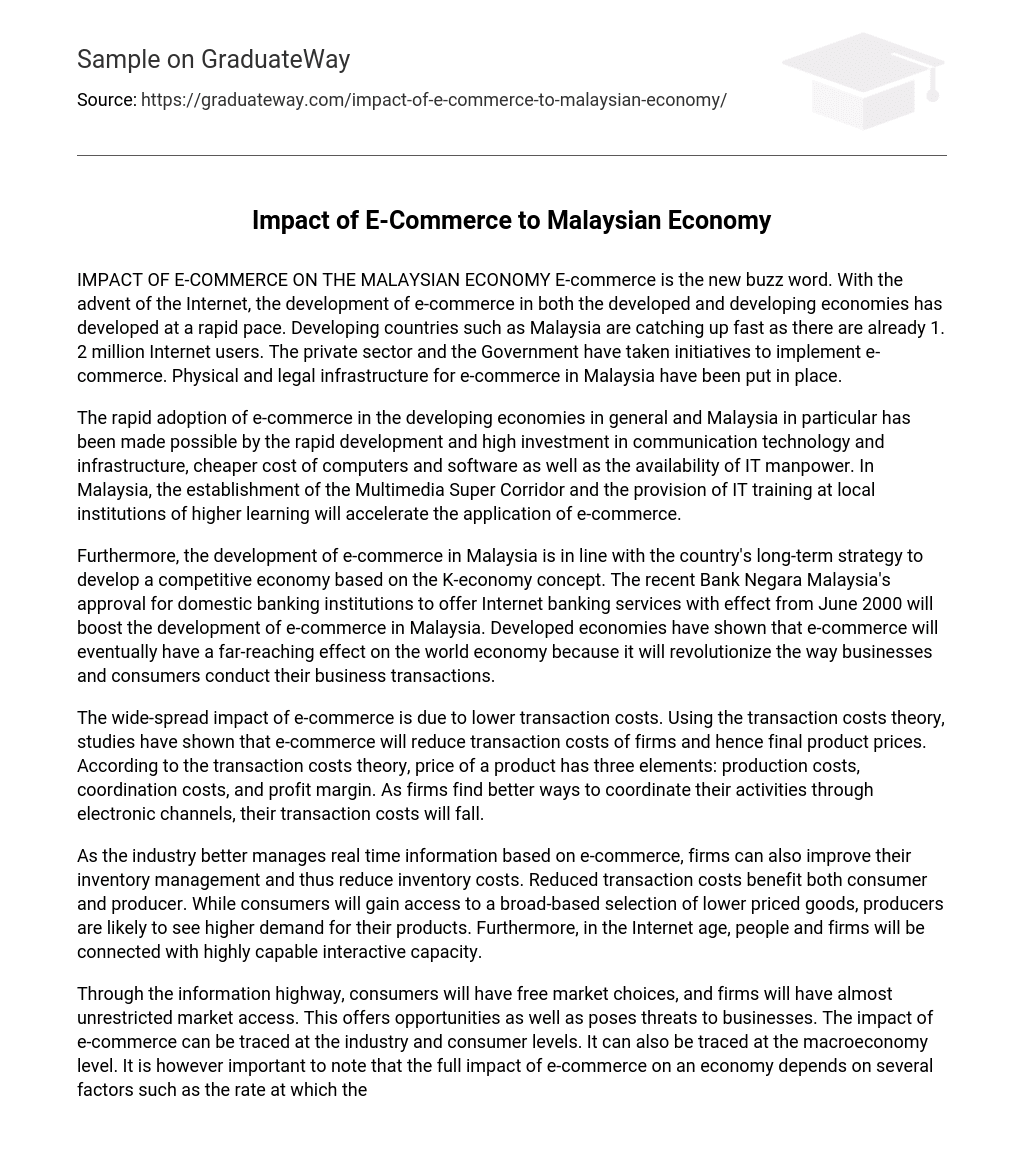The Internet has played a crucial role in the rapid expansion of e-commerce in Malaysia, benefiting both developed and developing economies. As a developing nation, Malaysia has made significant strides in adopting e-commerce, boasting 1.2 million Internet users. The progress can be attributed to efforts from both the private sector and government, which have established the necessary physical and legal infrastructure to facilitate e-commerce within the country.
The extensive development and significant investment in communication technology and infrastructure, affordable computers and software, and the presence of skilled IT professionals are responsible for the rapid growth of e-commerce in developing countries, such as Malaysia. The establishment of Malaysia’s Multimedia Super Corridor and the provision of IT training in local educational institutions will further enhance the implementation of e-commerce.The expansion of e-commerce in Malaysia supports the nation’s goal of developing a competitive economy through the K-economy concept. Bank Negara Malaysia has authorized domestic banks to provide Internet banking services since June 2000, which boosts the progress of e-commerce in Malaysia. Developed economies have shown that e-commerce will significantly transform the global economy by revolutionizing business and consumer transactions.
The reduction in transaction costs is the main reason for the significant impact of e-commerce. Studies on transaction cost theory indicate that e-commerce helps businesses decrease these costs, leading to lower prices for consumers. According to the theory, a product’s price is influenced by its production costs, coordination costs, and profit margin. As companies find more effective ways to coordinate their operations using electronic platforms, their transaction costs will decrease.
As e-commerce advances in processing real-time data, it brings benefits to both consumers and producers. Consumers can access affordable goods while producers see an increase in demand. Moreover, in the digital era, individuals and businesses will have interconnectedness with efficient interactive features.
The advent of the information highway provides consumers with a multitude of options and gives businesses widespread market reach, presenting both opportunities and challenges. The impact of e-commerce can be seen across different levels – industry, consumer, and macroeconomy. However, it is important to recognize that the effect of e-commerce on an economy depends on factors like the rate at which e-commerce is adopted. Specifically in industries, e-commerce will result in streamlining of operations.
Firms planning to adopt e-commerce need to make a suitable computer system investment, enabling their participation in knowledge-intensive activities. As a result, there will be an increased demand for employees with advanced computer literacy skills, impacting the available training resources. Moreover, firms will prioritize the selection and investment in technology.
This task is challenging, especially with the constant changes in telecommunications and computer technologies. To keep up with these advancements, firms must continuously invest in their human resources. Additionally, e-commerce will significantly reduce the industry’s product cycles. By utilizing e-commerce, firms will have immediate access to customer demands, allowing them to guide their product line development and identify new areas of growth. Armed with customer information, firms can effectively promote up-selling and cross-selling strategies.
The introduction of e-commerce will lead to increased investment by the Government, firms, and consumers. This increased investment will enhance productivity and efficiency in the economy, ultimately driving long-term economic growth. Furthermore, e-commerce will create new job opportunities and industries by leveraging IT.
The increase in economic activity to support expansion and growth will be propelled by the surge in investment and the emergence of new IT-based sectors. The rapid adoption of Internet technology will lead to significant growth in e-commerce for both developed and developing nations. Companies and consumers will benefit from advantages such as lowered transaction costs through e-commerce. Moreover, it will not only create new economic activities and job opportunities but also empower consumers and encourage greater competition in the economy.





